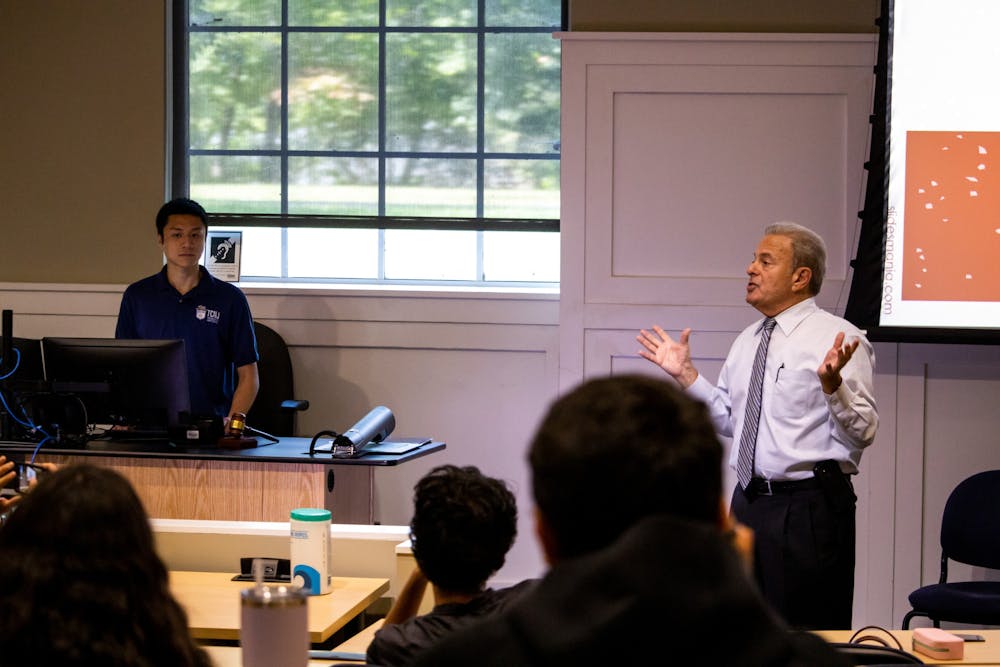By Briana Keenan
Staff Writer
Interim President Michael Bernstein talked to students about his plans for housing, tuition and student life at the Student Government (SG) general body meeting on Sept. 20.
Students were able to scan a QR code to ask President Bernstein questions, which were read off by SG President Dylan Nguyen.
Prior to responding, Bernstein gave a brief introduction about himself.
“Given my own experience at other institutions, I thought maybe, I could give some value as a member of the leadership team,” Bernstein said.
The most common topics that were asked about among students in attendance were differential housing and tuition, state funding and student life. Bernstein said the ideas he mentioned at the meeting and at his address to faculty on Aug. 30 are not confirmed to happen, but that he wants to propose ideas.
“If we go to a differential tuition model…the goal would be to eliminate fees and to make sure that there are scholarship resources for needful and worthy students,” he said.
This model would increase tuition for majors in which “costs of instruction are higher,” such as engineering and nursing, according to Bernstein.
“We need to do more analytics here,” he said. “This is a way for us to think strategically about how we’re doing things.”
The interim president does not have a timeline on when decisions like differential tuition will be implemented, but he said that he would rather start making changes in the next few months as opposed to the next few years.
Differential housing, which increases the price of housing for types with more amenities, was also discussed, and Bernstein explained what extra funding will go towards.
“We’re generating income to sustain the housing operation,” he said.
One student asked if it would be based on different styles of housing since upperclassmen dorms have more singles than doubles. Vice President for Student Affairs Sean Stallings was in attendance at the meeting and addressed this question.
“There are fewer dorms in the upperclassmen experience,” he said, “[The number] meets the demand we’re seeing…there will be more information regarding that in the coming weeks.”
In addition to differential housing, another topic that came up is the College making on-campus housing mandatory for first-year students. According to Bernstein, data shows that outcomes for retention, quality of academic performance and adjustment to the college experience increase when students live on campus for at least one year.
“We’re not treading into territory that’s unknown…it’s unfamiliar to us…but it’s not unfamiliar to our peer institutions,” he said.
Later in the meeting, one student asked about reaching more students out of state since the majority that attend the College are from New Jersey, and Bernstein said that improving the quality of the programs at the College and increasing marketing efforts will attract them more.
In terms of student life, Bernstein said he wants to help improve the quality of dorms, dining, co-curricular activities and facilities.
“I’d love to do all of these things right now, and I can’t,” he said.
When asked about diversity and inclusion, he said that it has improved over the years.
“We continue to identify underrepresented groups that in the past we have not recognized,” he said. “We don’t want them to feel any less of a lion in that regard.”
In addition to diversity and inclusion, Bernstein said that he wants to prioritize mental health resources for students at the College.
“We are both aware of and determined to meet the needs of students who have an array of challenges,” he said. “This is all about student welfare.”
Parking has also been a concern among students, especially for commuters. However, Bernstein said he is “unsure” of the next steps.
“There is enough parking for the students, it’s just not where people want it,” Stallings said.
Andrew LoMonte, a freshman political science major and newly elected student government representative, shared his thoughts about Bernstein’s conversation.
“I think it was beneficial for students to hear about his plans for his two-year term, as well as for him to hear the perspectives of TCNJ students that would be directly impacting us if implemented…it is a goal of mine to advocate for the needs of students to the administration,” said LoMonte.
The meeting ended with a discussion about state funding. Bernstein mentioned that he has a goal of acquiring more state funding for the College, but said the advocacy is more meaningful coming from students than him.
“When students advocate…it gets the attention of these officials,” he said. “You’re on the ground, you’re speaking with concrete authority and awareness.”







